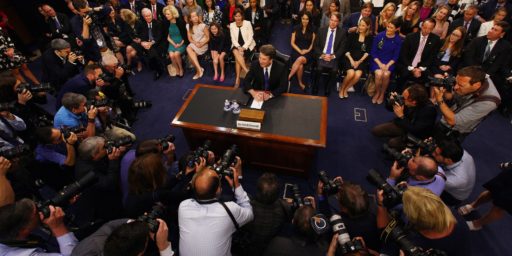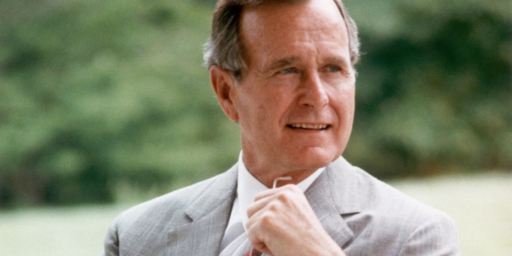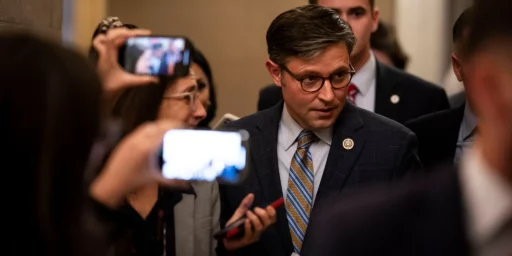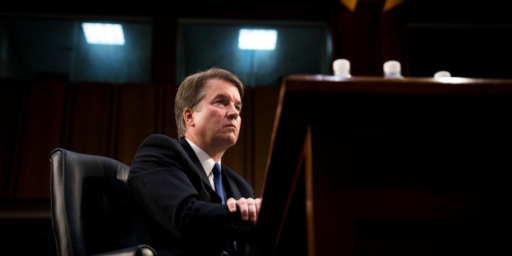Ending the Vice Presidency II
 Jeremy Lott’s attempted response to my response piece on “Ending the Vice Presidency” was, for some odd reason*, rejected altogether by my commenting system. Rather than pasting them into the comments of a post buried in the archives, I’ve done it below, with my original in blockquotes, followed by his retort in boldface, followed by my rejoinder, if any, in italics.
Jeremy Lott’s attempted response to my response piece on “Ending the Vice Presidency” was, for some odd reason*, rejected altogether by my commenting system. Rather than pasting them into the comments of a post buried in the archives, I’ve done it below, with my original in blockquotes, followed by his retort in boldface, followed by my rejoinder, if any, in italics.
What alternative system does Lott propose for dealing with these emergencies? Why, none at all! He doesn’t even mention the possibility!
Yes, I used the 400 odd words I was given to make the case against the vice presidency, per my assignment, and only hinted at what could replace it. The horror. OK, let’s take these from the top:
Except for the fact that the Southern states wouldn’t have signed on and we’d have been stuck with the Articles of Confederation, of course.
My point was, the slavery stuff is not part of the Constitution where people still say, “Oh they got that one right.” Did I overegg that one? Perhaps.
Um, Richard Nixon was a respected United States Senator who thrice got his party’s nomination for president, winning two landslides and losing the other in one of the closest contests in history.
Would he have got his party’s nomination if he wasn’t first vice president? I doubt it. Many of Nixon’s memorable moments — from Checkers to the Kitchen debate — came out of his vice presidency.
This is a fair point. Nixon was only 39 when tabbed for the VP slot by Eisenhower, having served only four years in the House and two in the Senate. He had become nationally prominent for his anti-Communism activities but might never have gotten a shot without the boost of the vice presidency.
Johnson and Bush were the second place finishers in their nominating contests. Bush would have almost certainly beaten Carter on his own merits. Further, we’ve had plenty of “troubling and divisive” people get elected to the presidency without a stint as second banana.
Carter managed to beat Ford and he lost very few seats in the midterm. He could have beat Bush, who was never a terribly impressive candidate. True, Johnson could have got the Democratic nomination. Winning would have been quite another thing.
Recall, though, that Ford barely lost despite the taint of having pardoned Nixon. Of course, we’ll never know the counterfactual. In 1960, Nixon would likely have beaten Johnson; then again, Nixon would be excluded by this rule, never having been VP, so we’re going totally hypothetical. As to 1964, virtually anyone would have beaten Goldwater, who was simply a candidate before his time.
As for those “troubling and divisive” presidents who didn’t stop off in the vice presidency first, please name them. That’s not a challenge; I’m honestly curious who you have in mind.
Well, George W. Bush and Bill Clinton come to mind just from very recent history.
Only the 12th — which (in effect) makes the VP part of the same ticket as the president rather than the second-place finisher in the — presidential race deals directly with the vice presidency; it was ratified 205 years ago. The 20th and 25th deal with arcane matters of presidential succession. The latter of which, incidentally, recognizes the dreadful possibility that the president is killed or incapacitated and there;s a vacancy in the vice presidency and remedies that.
We could split hairs over this “deals directly” business but that would be silly. All three amendments tweaked the vice presidency in some way, which was my point. Before the 25th amendment, if the president died or was forced aside then a person Congress designated became the president. That’s not an awful idea.
The fact a Constitutional amendment on the subject went through would be evidence to the contrary.
This is insane.
No it’s not.
Fair enough.
Seriously, we want a backup that’s independently elected and who could, theoretically, have an entirely different agenda than the guy who won? And who would take office and put in his own people? Really?
That’s happened before under the current system, so I fail to see your point. John Tyler was drummed out of the Whig party. Andrew Johnson was impeached and almost removed from office. Right up until Garfield was shot, Arthur was working against him.
That’s going back a piece. My recollection of the Tyler and Arthur presidencies is dim, indeed. As to Johnson, one might argue that he was carrying out policies Lincoln would have had he not been assassinated but lacked the charm and gravitas to carry them out. Moving ahead to the last half century or so, since presidents started getting nominated based on personal popularity rather than backroom deals with party bosses, it’s hard to conceive of a major shift in policy when the VP takes over. The only time it has been tested during that period was LBJ replacing JFK and, despite personal animosity and distinct policy differences, Johnson carried out the remaining months of the term under Kennedy’s legacy.
Presumably, then, we’d simply follow the Presidential Succession Act of 1947. Hello, President Nancy Pelosi! And, if something should happen to her, hello President Robert Byrd!
No, if history is a decent guide here it would be more like hello Gerald Ford. Congress would be unlikely to put Pelosi or Byrd-like figures in the relevant congressional positions if they were next in line for the Oval Office.
Under the 25th Amendment, if the vice presidency is somehow vacated, Congress appoints a replacement and, yes, a consensus candidate is the likely outcome. But for the last 62 years, the law has it that if the president and the vice president are simultaneously killed or incapacitated, the Speaker of the House takes over, with the President Pro Tempore of the Senate next in line. Presumably, if we abolished the office of vice president, we’d skip right to that.
But, sure, the Constitutional amendment that abolished the vice presidency could simply stipulate that Congress choose a successor. The problem, however, is that a sudden vacancy in the presidency — especially if a result of assassination — is a national emergency, possibly even a national security crisis. Do we really want to wait until Congress can be convened and make up its mind to replace the president?
Alternatively, I suppose, we could designate a cabinet officer — say, Secretary of State — to be the placeholder. Al Haig did a fine job, for example, after Reagan was shot. But this, too, creates potential problems. During much of our recent history, the Congress and the White House were controlled by different political parties. Without a vice president, this creates the strong possibility of an assassin’s bullet undoing the results of the election.
* Commenting was broken owing to a glitch caused by backend updates. Fixed now.






Of course is that we are making these decisions for what role is valid and invalid, and what role should provide a backup for the presidency, based on the personalities that fill them, fairly recently. Lott apparently feels that the role of VP is counter-productive based on what he calls a list of “troubling and divisive men” who have had that role. Obviously, this is rather like the blind men trying to identify an elephant by feel, each coming up with their different answer, based on what end they’re feeling at the moment. Put another way, the points he makes tend to get muddled when the line between personality and logistics gets fuzzy.
To wit; I can’t help but wonder personally whether not Mr. Lott is calling for the end of the vice presidency as a role, because of the pattern that has developed over the last several presidencies, not so much from a logistics point of view.
I think we can exemplify the pattern with the last few. Al Gore, Dick Cheney , Joe Biden.
In order, a complete moron who could not identify a bust of Ben Franklin upon looking at him, and is firmly convinced the best way to deal with the worlds problems is to cut off all energy use, Dick Cheney, who liberals don’t like, and yet was an extraordinarily strong a vice president at give in his president’s policy in the implementation thereof, and Joe Biden whose level of idiocy has yet to be defined, but is certainly looking promising, given his history, even since taking on the position.
There is much to dislike in that history of the VP, particularly for those of the center to left persuasion… (which I hasten to add, I doubt Mr Lott is sympathetic to, based on other reading I’ve done of him.)
There does seem to be plenty, however, to help sell Mr. Lott’s book on the topic of the vice presidency.
So, are we’re to eliminate the role of the vice presidency in these United States based on the fact that some people, apparently Mr. Lott included, don’t like a few of those who filled the role? Look; I happen to think Jimmy Carter and Bill Clinton, to be the two of the worst people for these United States in our history (aside from FDR, whose transgressions against this country were at least partially addressed by means of term limits) and yet I’m not screaming for the elimination of the presidency. SZo, on what basis are we to make such a move against the VP?
One may generously assume that Mr. Lott has a more insightful point of view on the vice presidency based on the research for his book. Yet the insights don’t seem to be clearly listed in the Washington post article promoting it.
Advocating the abolition of the OVP is merely addressing a symptom a of a greater problem. To be sure, our dysfunctional political system could use vast improvement. A parliamentary system would fix many of the problems, from obstructionism to elections to rogue offices.